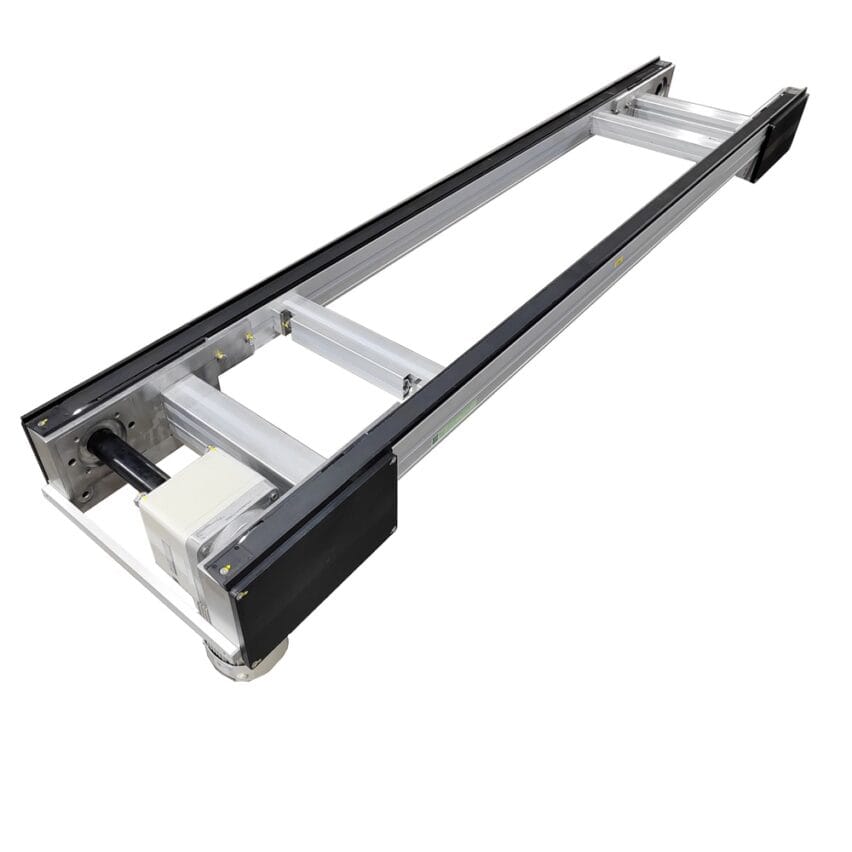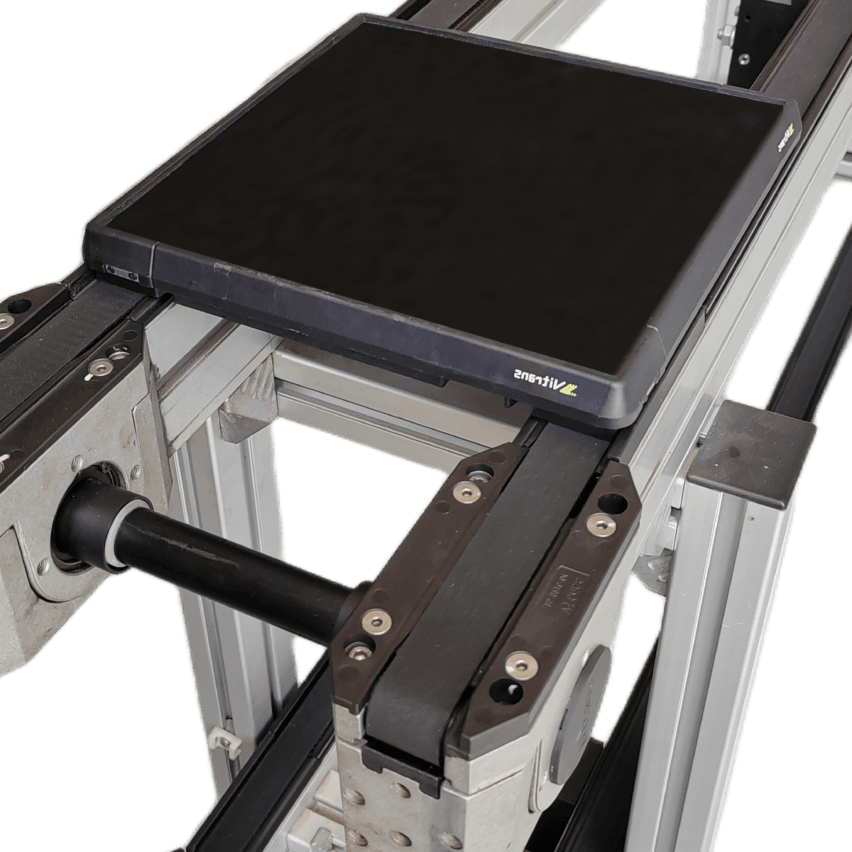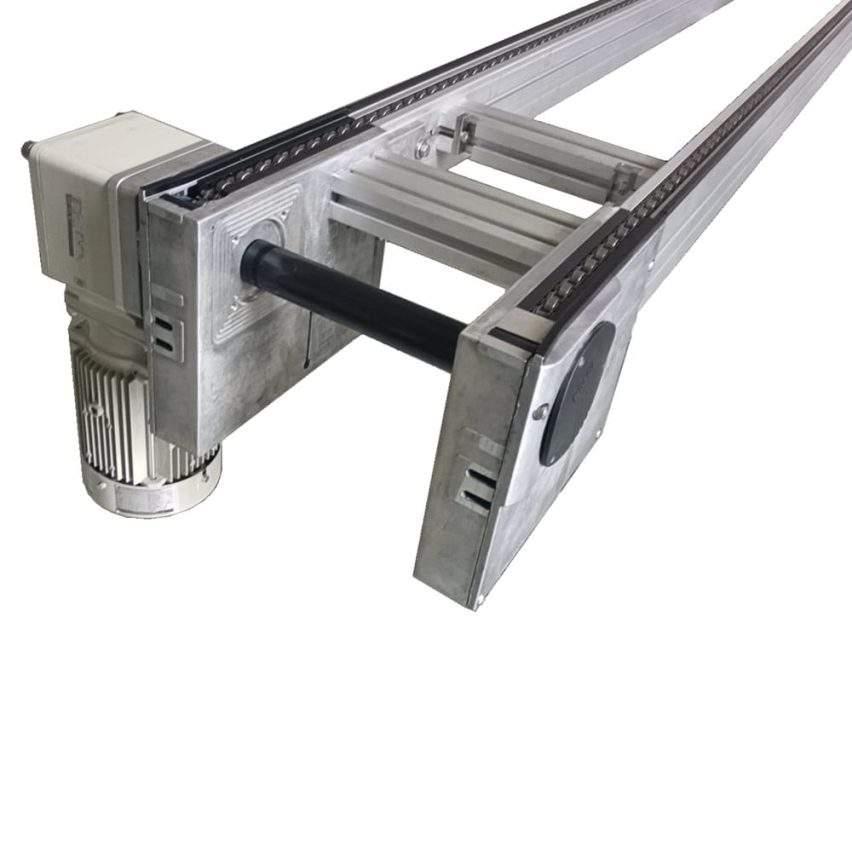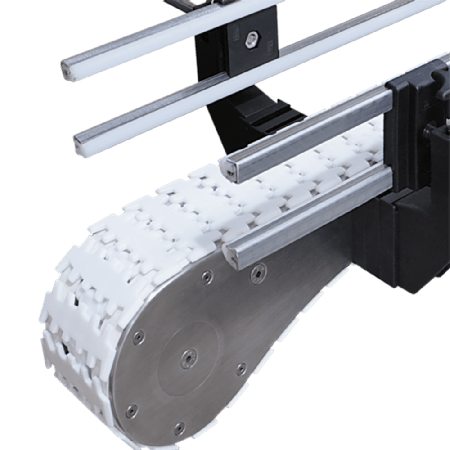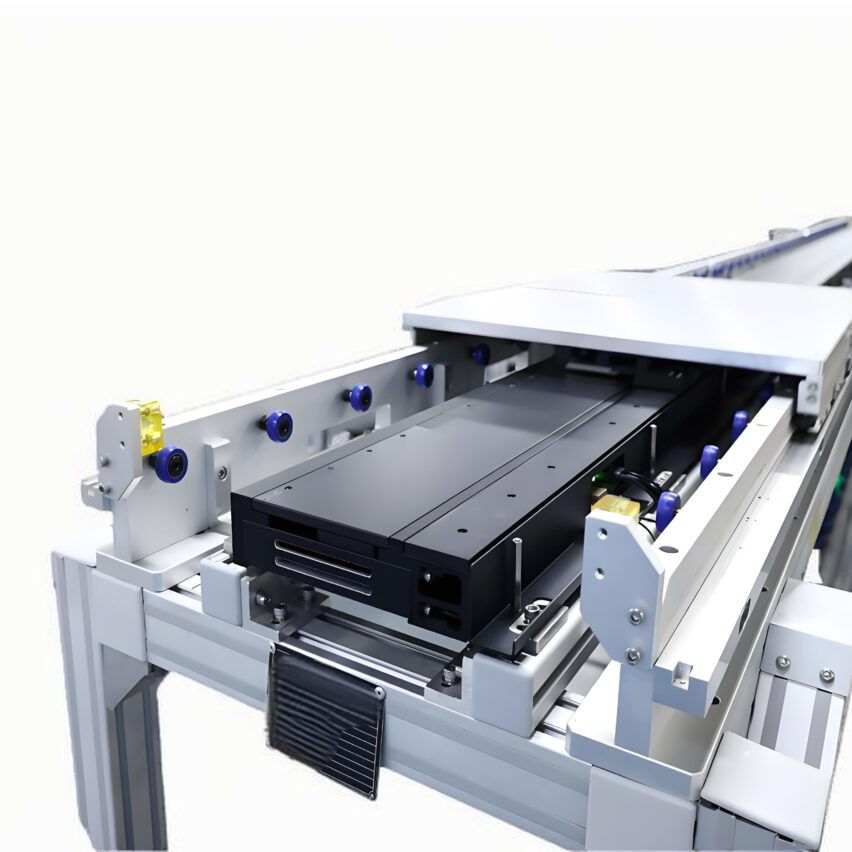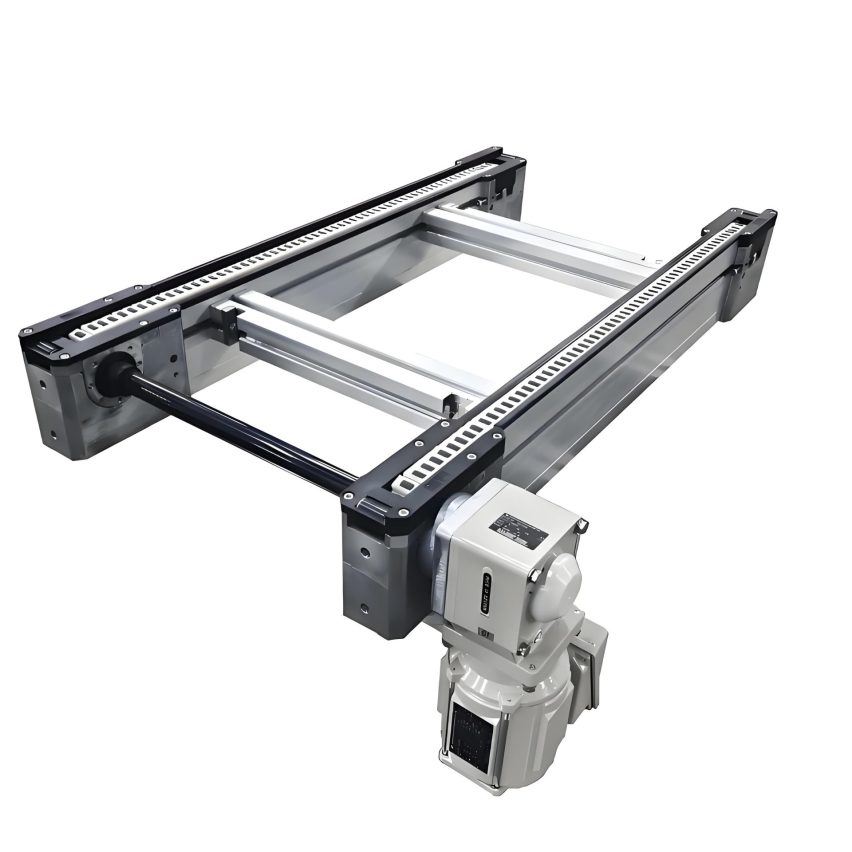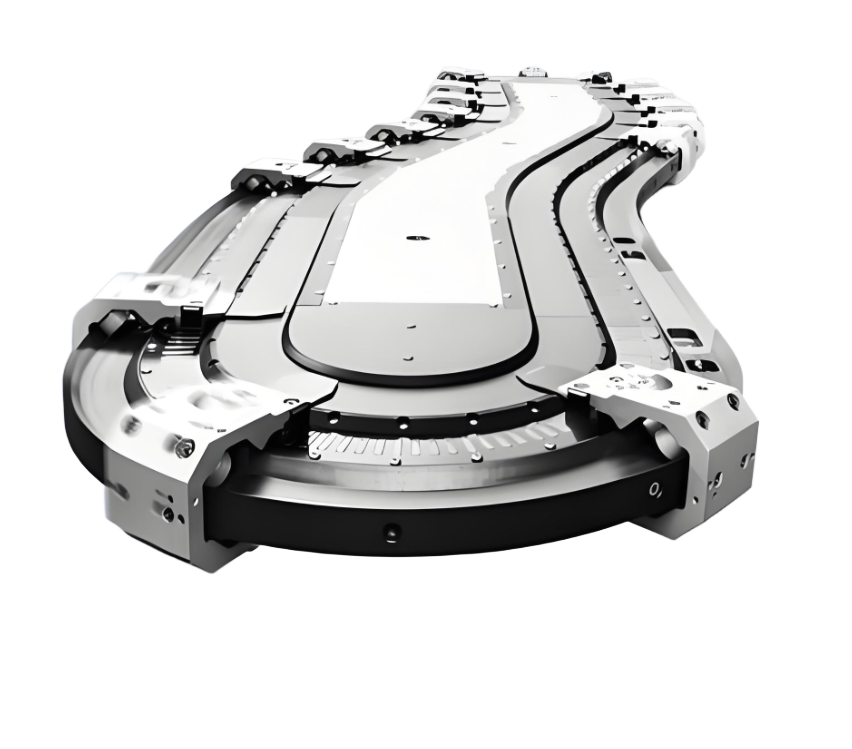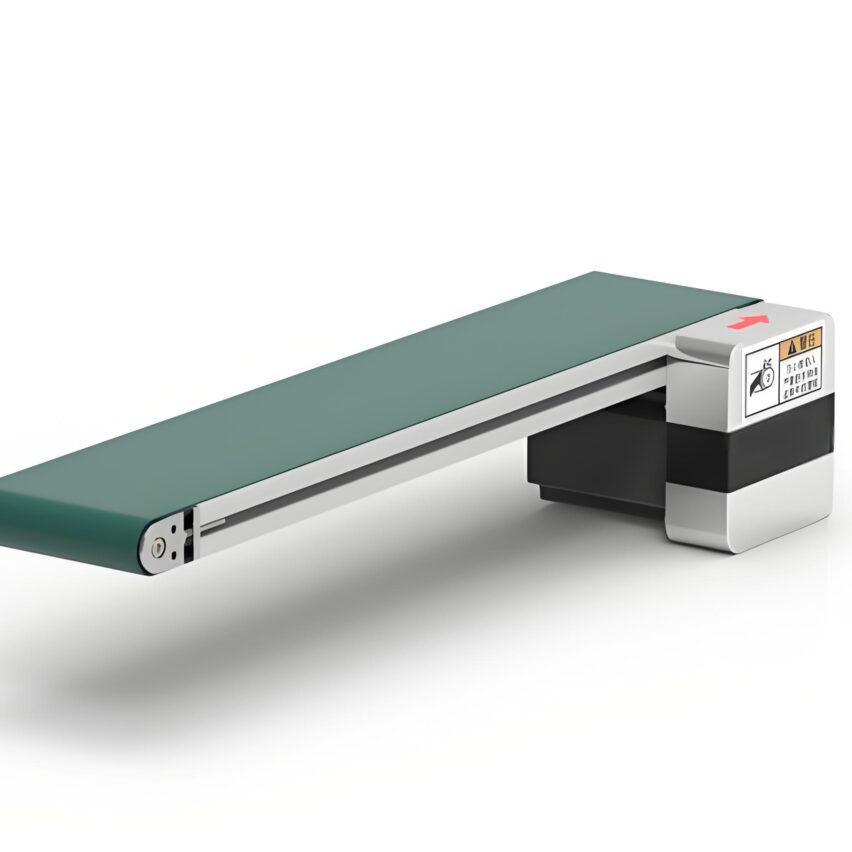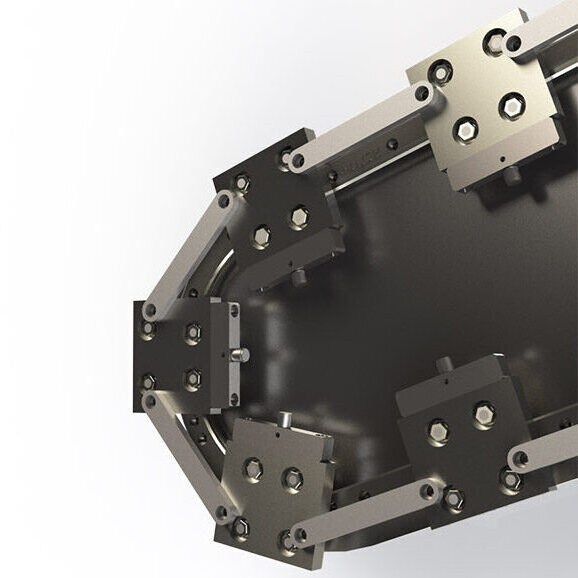I. Physical reconstruction of cyclic multiplier chains: a geometric code for space-time compression
The essence of the innovation of the cyclic multiplier chain isTransforming linear transport into a multidimensional cyclic topologyThe loop structure is designed to be used in the same way as a conventional conveyor line. While conventional conveyor lines still extend unidirectionally on a flat surface, the circulating structure extends through theThree-dimensional closed-loop designSpatial folding was achieved:
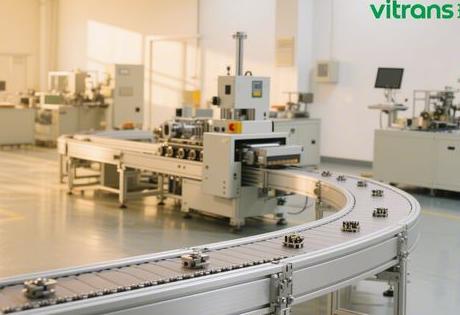
- Vertical Hub Technology: Use of double-layer track (bottom conveyor chain + top cache chain) to build a "conveyor - temporary storage" dual channel, automatically switching paths in the event of failure to avoid downtime of the entire line.
- Dynamic curvature compensationCurve section adopts variable diameter roller set, the outer ring diameter increases 5%-8% to offset the path difference, so that R1.5m sharp curve carrier offset ≤ ± 0.8mm
- Gravitational potential energy recovery: 3°-8° inclination of the downstream section, combined with a brake energy feedback system, resulting in a "batwing" energy consumption curve (valley power consumption = 351 TP3T peak).
A photovoltaic cell factory real test: single line logistics distance from 320 metres compressed to 112 metres, theIncreased space utilisation 186%The response time is reduced to 1/3 of that of a conventional conveyor line.
II. Three-dimensional breakthroughs in intelligent control: from mechanical drives to data neural nets
Far from simply stacking sensors, the intelligence of the cyclic multiplier chain isBuilding an Edge-Cloud Collaboration System for Distributed Decision Making::
1. Link-level edge computing
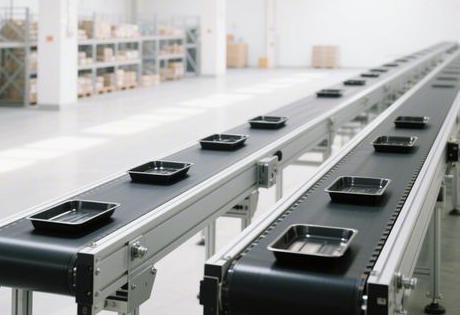
- Each board is equipped with an industrial-grade MCU, which calculates the amount of thermal deformation compensation in real time (response delay of 8ms).
- Achieve ±0.1mm positioning accuracy by linking RFID and trackside readers.
2. Dynamic caching algorithms
matlabmake a copy ofif Backend device failure rate > threshold Activate cache chain accumulation mode (maximum cache = standard chain capacity x150%) else Switch to Thru Mode (Beat Boost)25%) endThe algorithm improved the OEE (Overall Equipment Effectiveness) of an automotive welding line to 92.7%
3. Digital twin preview system
- Physics-based engine to simulate rail deformation under heavy load (0.01mm accuracy)
- An aerospace company compressed the cycle time for new model introduction from 14 weeks to 5 weeks after application.
III. Cytokinesis for Flexible Manufacturing: An Evolutionary Revolution in Modular Architecture
The modular design of the cycle multiplier chain is reconfiguring the genetics of the production line:
| Module Type | Functional characteristics | technological breakthrough |
|---|---|---|
| Removable guide rails | 127 x 100mm electrophoresis aluminium | 10 metres of line body reorganisation in 2 hours |
| Separate drive section | Inverter motor every 20 metres | Segmented speed regulation error ≤0.3m/min |
| snap-in connector set | T-slot + 24V DC quick-connect | Sensor Deployment Speed Up 300% |
| Oversize chain links | Carbon steel + roller bearings | Single pallet load 1000kg |
A home appliance company achieved 15 daily model changes through this architecture, and the product switching time was reduced from 47 minutes to 9 minutes.
IV. The temporal script of the industry's rebirth: from chip welding to heavy truck assembly
Semiconductor packaging and testingof disruptive applications:
make a copy ofThe wafer carrier completes the whole process of "cleaning - placement - reflow soldering" in the cycle chain. Clean room environment control: particle concentration ≤ Class 1000 (ISO 14644-1) Temperature fluctuation: ±0.3℃ (under nitrogen protection)Result: Welding ball defect rate reduced from 500ppm to 32ppm.
Heavy truck engine assemblyThen break the heavy-duty bottleneck:
- Tensile strength of carburised steel chain pieces increased to 1200MPa
- Magnetorheological fluid dampers absorb the kinetic energy of an emergency stop (500-fold viscosity jump in 0.1 seconds)
- Digital torque spanners linked to chain links, real-time return of bolt tightening data
A heavy machinery factory data: assembly error rate fell 76%, production line MTBF (Mean Time Between Failure) exceeded 4000 hours.
V. Quantum Entanglement in the Factory of the Future: When Superconducting Maglev Meets Edge Intelligence
The ultimate evolutionary direction of the loop multiplier chain is toBreaking the temporal and spatial constraints of physical contact::
- superconducting magnetic levitation (MLF) trackZero-friction conveying with ±5μm suspension accuracy and 82% lower energy consumption.
- photonic computing node: Workbench integrates photonic chips with arithmetic densities up to 10 TOPS/W
- Autonomous synergistic mechanisms: Spatio-temporal planning based on improved genetic algorithms (e.g., patent CN202010852034.9) for conflict-free multi-robot operation
The lab prototype shows that in a 12-robot collaborative scenario, the task completion time is 581 TP3T shorter than traditional scheduling, and the conflict point goes to zero.
Self-questioning: cable dancers through the technological fog
Q1: How to avoid the risk of resonance in multi-layer cyclic chains during emergency stops?
A.Triple anti-resonance control network::
- frequency scanning system: Real-time monitoring of the intrinsic frequency of each segment (sampling rate 10 kHz)
- Active Damping Array: Piezoelectric ceramic disc generates reverse vibration wave (cancellation rate ≥ 87%)
- mass-block tuner: Deployment of movable counterweights along guide rails (adjustment accuracy ±50g)
Q2: How does modular expansion ensure that the speed of each segment is synchronised?
A.Clock Tree Distribution Architecture::
level synchronisation timing error master controller 5G base station timing ±1μs Regionally driven segments Fibre optic distribution PTP protocol ±50μs Tooling Board Unit Edge Clock Calibration ±200μs
Q3: Can edge computing support real-time quality determination?
A.Lightweight AI model deployment solution::
- Model Distillation Technology:: ResNet34 → MobileNetV3 (compressed to 1/8 size)
- Early retirement mechanism: Early termination of inference at confidence >98% (latency reduced to 7ms)
- Federal Learning Update: Synchronised gradients per 200 inference (bandwidth usage <100Kbps)
When a fab achieves quantum positioning of 3,800 12-inch wafers per hour on a cyclic multiplier chain, that silver track suspended in a clean room is writing new industrial laws.True manufacturing intelligence does not lie in the interconnection of devices, but in the co-resonance of material and data flows in the spatial and temporal dimension. And in the cutting-edge labs, non-von Neumann architecture edge computing chips based on photonic crystals have broken through the 3nm process - perhaps in the smart factories of the future, the tightening torque of every bolt will be self-verified at the speed of light at the boundary between matter and bits.

